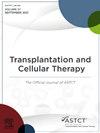一项评估植物乳酸杆菌预防胃肠道aGvHD的随机临床试验:来自儿童肿瘤学组(ACCL1633)的报告。
IF 3.6
3区 医学
Q2 HEMATOLOGY
引用次数: 0
摘要
胃肠道(GI)急性移植物抗宿主病(aGvHD)是异基因造血细胞移植(alloHCT)后非复发性死亡的主要原因。先前的研究表明,肠道微生物组可能影响胃肠道aGvHD的风险。我们进行了一项3期、随机、安慰剂对照的临床试验,以检验植物乳杆菌299v (LBP 299v)在预防GI aGvHD中的作用。参与者(N=161名可评估的参与者)从调理治疗开始到alloHCT后56天(D56)接受LBP 299v或安慰剂治疗。收集血液、粪便和临床资料,直到移植后120天(D120)。1-4期GI aGvHD的D120累积发病率分别为16%和15% (P=0.54), 2-4期aGvHD的总发病率分别为26%和29% (P=0.95), LBP 299v组和安慰剂组。无患者发生植物乳杆菌菌血症,严重不良事件发生率无差异(P=1.00)。LBP 299v与D0时微生物多样性增加(P=0.02)和D7时粘膜屏障损伤减少(P=0.02)相关。微生物特征组间差异显著;然而,这与研究的临床结果无关。我们得出结论,LBP 299v在接受同种异体造血干细胞移植的儿童和青少年中是安全的,但对预防胃肠道aGvHD无效。本文章由计算机程序翻译,如有差异,请以英文原文为准。
A Randomized Clinical Trial Evaluating Lactiplantibacillus Plantarum for the Prevention of GI aGvHD: A Report From the Children’s Oncology Group (ACCL1633)
Gastrointestinal (GI) acute graft-versus-host disease (aGvHD) is a leading cause of non-relapse mortality following allogeneic hematopoietic cell transplant (alloHCT). Previous studies have suggested that the intestinal microbiome may influence the risk of GI aGvHD. We performed a Phase 3, randomized, placebo-controlled clinical trial to examine the effect of L. plantarum 299v (LBP 299v) in preventing GI aGvHD. Participants (N = 161 evaluable participants) received LBP 299v or placebo from the start of conditioning therapy to 56 days post alloHCT (D56). Blood, stool, and clinical data were collected until 120 days post-transplant (D120). The D120 cumulative incidences of stages 1-4 GI aGvHD were 16% and 15% (P = .54), and overall grades 2-4 aGvHD were 26% and 29% (P = .95), LBP 299v and placebo groups, respectively. No patients developed L. plantarum bacteremia and no difference in serious adverse events was reported (P = 1.00). Administration of LBP 299v was associated with increased microbial diversity at D0 (P = .02) and reduced mucosal barrier injury at D7 (P = .02). Microbial signatures significantly differed between the groups; however, this was not associated with the investigated clinical outcomes. We conclude that administration of LBP 299v is safe among children and adolescents undergoing alloHCT but ineffective at preventing GI aGvHD.
求助全文
通过发布文献求助,成功后即可免费获取论文全文。
去求助
来源期刊

Transplantation and Cellular Therapy
Medicine-Hematology
CiteScore
7.00
自引率
15.60%
发文量
1061
审稿时长
51 days
 求助内容:
求助内容: 应助结果提醒方式:
应助结果提醒方式:


